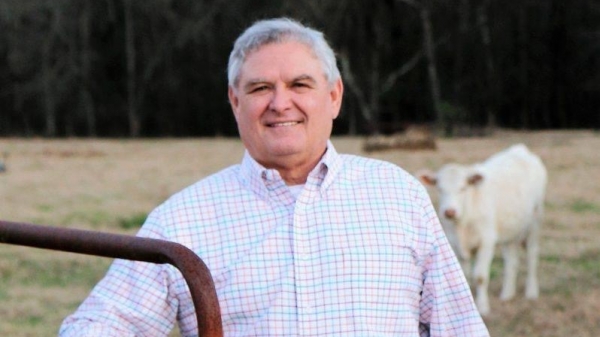By Brandon Moseley
Alabama Political Reporter
On Friday, March 13, members of Alabama’s Prison Reform Task Force briefed the Greater Birmingham Young Republicans (GBYR) on impending prison reform legislation. Alabama’s prisons are at 192 percent capacity and state officials fear a costly federal takeover of the State’s chronically underfunded corrections system. For the last nine months, the task force, headed by State Senator Cam Ward (R-Alabaster), has been studying how to gradually reintegrate non-violent offenders from the state’s overcrowded prisons to Alabama society without an increase in crime.
Senator Ward, Alabama Department of Corrections Deputy Commissioner for Government Relations Jeffery Williams, and Judge Teresa Pulliam spoke to the GBYR area political leaders, and attorneys at Cantina Laredo in Birmingham prestigious new Uptown Development near the Birmingham Jefferson Civic Center. The GBYR is chaired by Jackie Curtiss.
Commissioner Williams said that everyday life skills like getting a job and writing a resume are difficult for man of the prisoners. Williams who has worked his way up from prison guard, to warden, to his present position said that if we work with offenders reintegrating them back into society then recidivism is less than if they can go straight from jail back into society.
Williams said that the State needs to do a better job on offender transition. Community corrections is a significant player in keeping nonviolent offenders out of the prison system and gives sentencing options to judges other than probation or prison.
Have had a relationship over the years to working with the sentencing commission.
Judge Teresa Pulliam said that it is very important for the State of Alabama that we have this conversation. Governor Robert Bentley, Speaker Mike Hubbard, and Chief Justice Roy Moore have supported the work of the task force. The task force has worked with all aspects of the system. All of which are way understaffed and underpaid. Prison guards are putting their lives at risk every day going to work.
Judge Pulliam said that this task force is dedicated towards dealing with those offenders who are what we call the revolving door offenders that keep coming and going. “They come – we let them out.” There is no way for them to get a job. We are doing nothing to stop recidivism.
Pulliam said Alabama can do this. Texas, Georgia, North Carolina, and South Carolina have all already done this. Alabama can see a drop in recidivism. I commend Senator Ward. This is not a popular subject to take on for legislators.
Senator Cam Ward said this is a complex subject, but it is very interesting. Ward said that he has served on both the Senate Judiciary Committee and the Budget Committee, which allows him to see both aspects of this. Wards said that Alabama spend less than anybody else in the country on prisons, but incarcerates more than anybody else in the country (on a percent of the populace basis).
Sen. Ward said that 55 percent of the prison population have a mental health disorder and 72 percent have a drug condition. 98 percent will come out at some point. We are spending money on a system that just does not work. You can’t just lock them in a cage and think somehow that cures them.
Ward said that it is politically popular to just say put everybody in jail. The problem is we do that but we are not willing to back that up with the financial resources to do that. Ward said that building enough prisons to solve our capacity problem would require over a half a billion dollars in new taxes. We could ignore the problem and eventually a federal judge will handle it. Real reform however saves money and it is smarter.
Judge Pulliam said that prisons have become overcrowded primarily with drug addicts that steal to support their drug habits. We incarcerate them and let them out with no job, no way to get a job Now we are letting everybody out that can possible be let out because there is no room and often we let them out without a required supervision period.
Judge Pulliam said that we have to give hope and jobs to released inmates. If they are not going to get off drugs they are not going to stop stealing.
Williams said that presently 38 percent leave without any post supervision. We want every inmate that leaves prison to have some supervision. We need that period of supervision to combat recidivism. The average parole office has a caseload of 200 or more that is too much to be effective. Alabama has a 34 to 35 percent recidivism rate, with close supervision that is just 12 percent.
Sen. Ward said “Wouldn’t you rather have that than have someone released with no supervision released into your neighborhood? If you don’t comply you are going back on. That sounds good but the amount of money you can save through post incarceration supervision is tremendous. “Wouldn’t you rather them get a job pay their taxes and be a productive member of society rather than be a threat to society?”
Ward said that the Corrections System needs to make sure that released inmates address their mental health and drug abuse issues. This has been an 8 month process. We looked at what other states did and listened to judges, prosecutors, victim rights activists, the ACLU, and even inmates’ rights groups.
Ward said that the plan is to lower the prison population from 192 percent capacity to 132 percent capacity over five years. What we have proposed is something that nobody is completely happy with but everybody is 85 to 90 percent happy with. The bill that was released on Friday, the new substitute for SB 67, is about 121 pages. We did not break it up into ten parts, because if we did that then legislators will vote for the easy stuff and vote against the hard stuff.
Birmingham Attorney Justin Barkley who moderated the forum asked if the package goes far enough to avoid federal intervention. Ward thought it did.
Commissioner Williams said that persons convicted of the new class D felonies will be going into a community corrections programs. In many cases with class D offenders the victim is the defendants themselves. The legislation addresses who will go to prions and how long they will stay without sacrificing public safety.
Judge Pulliam said that probation officers will punish minor offenses like a positive drug test or failure to report swiftly. I am a full-time criminal judge. That is all that I do. This program will be a way to deal with the situation immediately.
Sen. Ward said that most of the sentencing guidelines were made on the front end two years ago. We have had less people going to jail without an increase in crime. Ward said that with this new post release system there will there be a system to make sure that the convict complies with the law. Punishment for technical violators will be swift and sure. If you violate the terms you will spend time in jail.
Cam Ward said that the prison education budget is only $4.1 million, but only $38,000 of that money is actually going into skills training. You have a 2 year system that is diverting that money off. We need to make sure that the money we are appropriating is actually used like it is intended.
Ward said, “We have to have a capacity increase. There is no way around it…Facilities that we built in the 1930’s and 1950’s can not be upgraded to where they are safe…You cannot upgrade Tutwiler…We will call for a minimum of 5000 new beds over the next five years. To think you can avoid that is ludicrous.”
Williams said that the state legislature gave us $5 million to add new officers. The Corrections System is losing officers to to other law enforcement agencies where they get a weapon and a vehicle. We need to improve the working conditions. Last year 433 new officers were able to get through the academy; but the system is still struggling after a 2010 dip in funding led. I think this will help.
Ward said that this plan will cost about $130 million over the next five years, but how much are you going to spend versus taking another path? Simply building our way into compliance would cost $700 to $800 million. This plan will require a revenue increase, but that was already planned.

















































